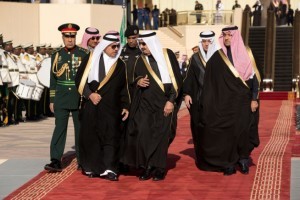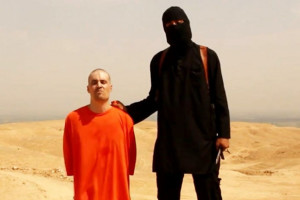After terror attacks, there is a rush to identify who’s to blame and to analyze what the slaughters may mean, but often the facts are tenuous and the reality is hazy, observes ex-CIA analyst Paul R. Pillar.
By Paul R. Pillar
A certain litany of comments and even vocabulary seems to be required after terrorist incidents. High-casualty attacks are “horrific,” certain methods of attack are said to be the “hallmark” of certain groups, and so forth. And with any set of incidents occurring within a short time, explanations are offered that assume a connection among the incidents, especially in terms of a presumed careful strategy being executed by a particular group.
The appetite for such explanations is understandable, and the press is only doing its job when it solicits them. But usually the interpretations outrun what the available information would justify. Humans are wired to see patterns and tend to see them even when they don’t exist.

King Salman of Saudi Arabia and his entourage arrive to greet President Barack Obama and First Lady Michelle Obama at King Khalid International Airport in Riyadh, Saudi Arabia, Jan. 27, 2015. (Official White House Photo by Pete Souza)
This is true of much of what has been said of the attacks during the past week in Turkey, Bangladesh, Iraq, and Saudi Arabia. The timing of these attacks coming close together might not be just coincidence, but then again it might. Perhaps the holy Islamic month of Ramadan has something to do with the timing, either in presenting easier targets with crowds of people gathering at certain times and places or in sending a message related to terrorist claims of acting on behalf of a religious cause.
But it is just as plausible that the timing of the attacks, as with the timing of many terrorist attacks, is related more to operational opportunities that have nothing to do with holy months or simply to when preparations for an operation happened to be complete.
Also typical is much interpretation about what the method of attack indicates about the sophistication of the attackers, and what this in turn means about who is responsible for the attack. In the current case there have been observations about how each of the attacks involved teams of people, and how this supposedly makes them more organized, and more sophisticated, than “lone wolf” attacks.
Part of the problem here is the ubiquity of the “lone wolf” term, which has led to overstatement of the significance of any difference between an operation involving one person and an operation involving more than one. It does not take a lot of sophistication to organize three people, and whatever organizational facility is required can be supplied locally and not just by some large and distant group.
Moreover, there are different scales on which to measure sophistication besides the number of people involved. Success in killing people other than oneself might be one of those ways of measuring. The recent attacks have presented a mixed picture in this regard. The triple suicide bombings in Saudi Arabia don’t look very sophisticated. One of the bombers managed to kill four security guards, but the other two blew up no one but themselves.
Assessing ISIS
An especially prominent subject in the current commentary concerns the role of ISIS, or its presumed role. One of the difficulties in trying to identify what ISIS — i.e., the gang that has established a mini-state in parts of Iraq and Syria — is really responsible for is that ISIS has become the most popular and prominent brand name among violent Sunni extremists, many of whom see advantage in invoking that brand name even if they really aren’t taking any orders from ISIS.

Journalist James Foley shortly before he was executed by an Islamic State operative, known as Jihadi John.
Another difficulty is that ISIS has an incentive to claim responsibility for many operations that it did not actually perpetrate, to convey an impression of power and reach greater than what it really has. Of the recent well-publicized terrorist attacks, the one for which it is least likely that ISIS is responsible is that in Bangladesh, even though ISIS claimed credit for the attack and even though one of the local extremist groups that is a credible suspect has declared fealty to ISIS. Actual ISIS involvement is more likely in the other attacks farther west and closer to ISIS’s mini-state, but then again we do not know.
To the extent that ISIS really is involved in any of the recent attacks — an important qualification — then we probably are seeing a rise in attacks now partly as a reaction to the group’s losses on the ground in Iraq and Syria. Although that may sound like just an effort to put a positive gloss on a negative happening, it isn’t. Such a pattern would be consistent with how terrorism and ground warfare have entered into earlier wars, such as the war for Algerian independence in the 1950s and 1960s.
Some of the perpetrators’ thinking may center on the particular states targeted. Anything that prolongs political turmoil in Iraq and undermines support for the Abadi government — which bombings in Baghdad tend to do — helps ISIS to hang on a little longer in territory in controls in Western Iraq.
And attacks against Turkey may be related to changes in Turkish policy that have made Ankara more directly opposed to ISIS than it was before. But the main reasoning would be that any violence that is conducted far and wide in the name of ISIS, or that people suspect was fomented by ISIS, helps to sustain an impression among the group’s supporters and would-be recruits that it is alive and kicking and not on the decline.
Paul R. Pillar, in his 28 years at the Central Intelligence Agency, rose to be one of the agency’s top analysts. He is now a visiting professor at Georgetown University for security studies. (This article first appeared as a blog post at The National Interest’s Web site. Reprinted with author’s permission.)

Murky in the sense that “terrorists” are funded, armed, and otherwise aided with logistical support by intelligence agencies? What is the “message” in this?
Certainly some “events” are of an isolated variety and some events are connected (loosely to intrinsically). What’s the “message” in this?
Some events require complexity or sophistication, others do not. What’s the “message” in this?
Is ISIS alive and kicking or on the decline? Who’s saying? What’s the “message” in this?
Here is a question not often answered; why are we fighting people in the Middle East in the first place? Seriously, I have forgot the official reason, or reasons. What in the world has Syria, or Libya, have to do with anything any American has to deal with? Would there have even been an Orlando shooter, if America had not gotten itself involved in these Middle Eastern adventures. Is the lost of our own military and innocent lives,mean nothing to anyone? Is having this country’s returning soldiers come home from the many deployments they serve, only to suffer from PTSD and have their families endure the stress from it, worth all of this? So, once again, why are we even there? Or would I do better to ask an Israeli?
You are asking the most important question,which needs to be asked again and again…why are we there?
I think the answer follows the non-question in the beginning, that America is a perpetual war state and needs to keep its active and highly profitable war machine humming and killing, wherever there is oil, precious minerals, or murky geo-strategic rationales to titillate the minds of the rich and powerful and delusional, who really need to get grounded instead of going high-flying off to another country to destabilize, bastardize, and/or functionally destroy or at least set it back for a few decades.
Who needs social progress, educated policies, and discovering their own destiny apart from the world banking and capitalist system? Competitive capitalist all for those precious war profits.
Like George Bush said, “You are my base–the haves and have mores” and Iraq will be a bonanza for war contractors–the real reason for most US wars-monetary gain, not territory, counter-terrorism, or defending our land. Like their sending troops for any rational and moral reason…right! fight the right and don’t be afraid of what’s left! Put the extremist Republicans and Tea Party crackpots out of office forever!
Chris well it’s good to know how someone else agrees with my statement.
Since in my career I was able to mix among the very people who when contracted would manufacturer items which could be used on heavy equipment, or to be used on military equipment, I can tell you that to machine a piece of metal, or mold a piece of rubber for either just doesn’t matter what it’s end use turns out to be. It could be something to build with, or something to kill people with, it just doesn’t matter. A company who machines components for a hand gun, is often the same machine shop which manufacturers bone screws, or surgical tools. A machine is just a machine, so we could be doing something much better with such industry’s which manufacturer war product, by converting them over to making peace time needed materials, which would improve life for the living.
When it comes to the Middle East, I think we are being used by Israel, and that we are enforcing the Yinon Plan for Israel. Although oil is never that far off the table, the oil companies weren’t that crazy about our approach we used to invade Iraq. I mean, chaos isn’t a good working environment, so what else could have motivated our decision to invade. The one reason that trumps all, is money, and you are right to take note of such contracting concerns such as Halliburton, KBR, or Blackwater USA (or whatever name they are using now) as being the beneficiaries of said contracts. I’m sure you have taken notice as well, that to secure such business with the government, one better be well connected, also.
We can do better. Keep the faith Chris, you are not wrong. JT
“Murky”? “Hazy”? “Tenuous”? It could be this, but again it might be that, it might be ISIS or it might not be ISIS…..oh my its all so confusing!!! Did the “Yemen Switchboard” break down??? Or maybe its just The Langley Fog Machine blowing smoke to cover the tracks of “The Company”???